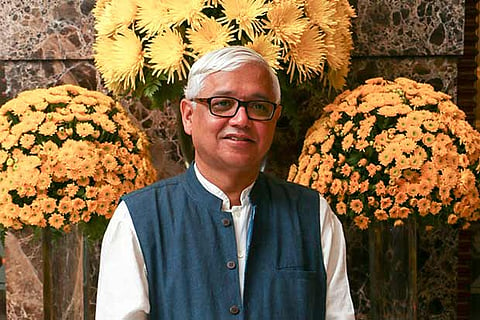

Chennai
Speaking to DT Next , Amitav points out that people, even those who have suffered due to extreme climatic events like the recent Chennai deluge, soon lose interest in the subject as they perceive it to be of a freakish nature. “These are not freak events but the new normal, what climate change has brought about. And, the problem is we are not in any sense adjusting to this new normal. It is something we don’t want to pay attention to because it is problematic. But these issues won’t go away – they are on our doorsteps and will keep returning to haunt us,” he predicts.
The author recalls witnessing a freak tornado in Delhi in 1978. “That is an event which I recount in the book, though it is not necessarily a result of climate change. When I was a 21-year-old part-time journalist and preparing for my MA exams, I was outside and took a route that I usually never do. Suddenly, I heard this sound and when I looked back, I saw a dark cloud in the sky. As I was looking at it, a sort of a tube came out of this cloud and was heading directly towards me. I had the good sense to run and seek shelter in a balcony of the nearest building. The sound grew louder and louder, when I looked up, I saw scooters and tea stalls shooting through the air. It was unbelievable as it was the only tornado to strike the capital,” he narrated.
However, Amitav recalls that the impact was not immediate, drawing attention to the fact that stories of climate change are often untold. “This freak event occurred almost 40 years ago but I am talking of it now. The events set in motion by climate change are such that they are difficult to articulate. That is why I think writers have to find a way to write about these events. These are stories of our future, ones that need to be urgently told,” said the author, who got interested in geology and weather patterns while working on his 2004 release, The Hungry Tide .
There is a sense of inertia towards climate change, says Amitav. The author puts forth a terrifying hypothesis. “Chennai historically had many destructive cyclones. Imagine, one day, if you were to wake up and get the news that a giant superstorm is coming towards Chennai. Apart from the impact of the cyclone, there will be these manmade interventions, like unplanned construction, which will add to the catastrophe. Then, you learn that you have to evacuate. That’s when you start thinking – where will you go? What is the plan? Even if we decide to leave, where will we go? We need to ask ourselves that,” says the author, who was shortlisted for the Man Booker Prize.
Amitav says one of climate change’s biggest impact could be mass migration, which he points out, is already underway. “During this drought, hundreds and thousands of people were leaving Bundelkhand in central India and a great majority won’t return. Whole villages exist where houses are locked and only old people remain. But we are not paying attention to that, are we?” he concludes.
Visit news.dtnext.in to explore our interactive epaper!
Download the DT Next app for more exciting features!
Click here for iOS
Click here for Android